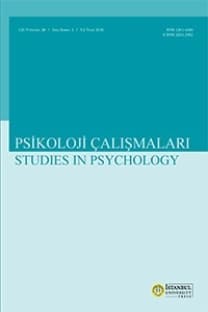Kısa Psikolojik Uyum Ölçeğinin Türkçe Uyarlamasının Test Edilmesi ve Ruh Sağlığı ile İlişkisinin Değerlendirilmesi
Kısa Psikolojik Uyum Ölçeği, cinsiyete göre ölçme değişmezliği, geçerlilik, Türkçe uyarlama, ruh sağlığı
Testing a Turkish Adaption of the Brief Psychological Adjustment Scale and Assessing the Relation to Mental Health
rief Psychological Adjustment Scale, gender invariance, validation, Turkish adaptation, mental health,
___
- Bantjes, J., & Kagee, A. (2018). Common mental disorders and psychological adjustment among individuals seeking HIV testing: A study protocol to explore implications for mental health care systems. International Journal of Mental Health Systems, 12(1), 16. doi: 10.1186/s13033-018-0196-0 google scholar
- Bender, M., van Osch, Y., Sleegers, W., & Ye, M. (2019). Social support benefits psychological adjustment of international students: Evidence from a meta-analysis. Journal of Cross-Cultural Psychology, 50(7), 827-847. google scholar
- Chambers, S. K., Ng, S. K., Baade, P., Aitken, J. F., Hyde, M. K., Wittert, G., Frydenberg, M., & Dunn, J. (2017). Trajectories of quality of life, life satisfaction, and psychological adjustment after prostate cancer. Psycho-Oncology, 26(10), 1576-1585. google scholar
- Chen, F. F. (2007). Sensitivity of goodness of fit indexes to lack of measurement invariance. Structural Equation Modeling: A Multidisciplinary Journal, 14(3), 464-504. google scholar
- Cruz, R. A., Peterson, A. P., Fagan, C., Black, W., & Cooper, L. (2019). Evaluation of the Brief Adjustment Scale-6 (BASE-6): A measure of general psychological adjustment for measurement-based care. Psychological Services. Advance online publication. http://dx.doi.org/10.1037/ ser0000366 google scholar
- Diener, E., Emmons, R. A., Larsen, R. J., & Griffin, S. (1985). The satisfaction with life scale. Journal of Personality Assessment, 49(1), 71-75. google scholar
- Durak, M., Senol-Durak, E., & Gencoz, T. (2010). Psychometric properties of the satisfaction with life scale among Turkish university students, correctional officers, and elderly adults. Social Indicators Research, 99(3), 413-429. google scholar
- Ferguson, E., & Cox, T. (1993). Exploratory factor analysis: A users’ guide. International Journal of Selection and Assessment, 1(2), 84-94. google scholar
- Freitas, I. R., Castro, M., Sarmento, S. L., Moura, C., Viana, V., Areias, J. C., & Areias, M. E. G. (2013). A cohort study on psychosocial adjustment and psychopathology in adolescents and young adults with congenital heart disease. BMJ Open, 3(1), , e001138. google scholar
- Hu, L. T., & Bentler, P. M. (1999). Cut off criteria for fit indexes in covariance structure analysis: Conventional criteria versus new alternatives. Structural Equation Modeling, 6, 1-55. doi: 10.1080/10705519909540118 google scholar
- Iacobucci, D. (2010). Structural equations modeling: Fit indices, sample size, and advanced topics. Journal of Consumer Psychology, 20(1), 90-98. google scholar JASP Team. (2017). JASP (Version 0.8.2) [Computer software]. Retrieved from: https://jasp-stats.org/ download/ google scholar
- Lambert, M. J. (2015). Progress feedback and the OQ-0073 system: The past and the future. Psychotherapy: Theory, Research, & Practice, 52, 381-390. google scholar
- Lambert, M. J., Harmon, C., Slade, K., Whipple, J. L., & Hawkins, E. J. (2005). Providing feedback to psychotherapists on their patients’ progress: Clinical results and practice suggestions. Journal of Clinical Psychology, 61(2), 165-174. google scholar
- Lambert, M.J., Morton, J., Hatfield, D., Harmon, C., Hamilton, S., Reid, R., Shimokawa, K., Christopher-son, C.D., & Burlingame, G. (2004). Administration and scoring manual for the Outcome Questionnaire (OQ-45.2) (3rd ed.). Wilmington, DE: American Professional Credentialling Services LLC. google scholar
- Lovibond, P.F., & Lovibond, S.H. (1995). The structure of negative emotional states: Comparison of the Depression Anxiety Stress Scale (DASS) with the Beck Depression and Anxiety Inventories. Behaviour Research and Theory, 33(3), 335-343. google scholar
- Miller, S. D., Duncan, B. L., Brown, J., Sparks, J. A., Claud, D. A. (2003). The Outcome Rating Scale: A preliminary study of the reliability, validity, and feasibility of a brief visual analog measure. Journal of Brief Therapy, 2(2), 91-100. google scholar
- Peterson, A. P. (2015). Psychometric Evaluation of the Brief Adjustment Scale-6 (BASE-6): A New Measure of General Psychological Adjustment (Master Dissertation). University of Washington, Washington, USA. google scholar
- Revelle, W., & Zinbarg, R.E. (2009). Coefficients Alpha, Beta, Omega, and glb: Comments on Sijtsma. Psychometrica. 74(1), 145-154. google scholar
- Rodriguez-Fernândez, A., Ramos-Dı'az, E., Madariaga, J. M., Arrivillaga, A., & Galende, N. (2016). Steps in the construction and verification of an explanatory model of psychosocial adjustment. European Journal of Education and Psychology, 9(1), 20-28. google scholar
- Samios, C. (2018). Burnout and psychological adjustment in mental health workers in rural Australia: The roles of mindfulness and compassion satisfaction. Mindfulness, 9(4), 1088-1099. google scholar
- Yıldırım, M., & Belen, H. (2019). Evaluation of Short Depression Happiness Scale: A reliability and validity study. Presented at the 21st International Psychological Counseling and Guidance Congress, Antalya, Turkey. google scholar
- Yılmaz, Ö., Boz, H., & Arslan, A. (2017). Depresyon Anksiyete Stres Ölçeğinin (DASS 21) Türkçe kısa formunun geçerlilik-güvenilirlik çalışması. Finans Ekonomi ve Sosyal Araştırmalar Dergisi (FESA), 2(2), 92-104. google scholar
- Xu, H., & Tracey, T. J. (2017). Use of multi-group confirmatory factor analysis in examining measurement invariance in counseling psychology research. The European Journal of Counselling Psychology, 6(1), 75-82. doi:10.5964/ejcop.v6i1.12 google scholar
- ISSN: 1304-4680
- Başlangıç: 1956
- Yayıncı: İstanbul Üniversitesi
Tezcan Zeynep ÖZKAN TİLKİ, Semra GÜNEY, Selin Metin CAMGÖZ
Göçün Kuşaklararası Bağlamda Psikopatolojik Yansımaları
Ayla HOCAOĞLU UZUNKAYA, Banu YILMAZ
İpek Pınar UZUN, Özgür AYDIN, Canan KALAYCIOĞLU, İclal ERGENÇ
Duygusal Tanıma Belleğinin Sağlamlaşma ve Kodlama Aşamaları Temelinde İncelenmesi
Sinem SÖYLEMEZ, Berk YAŞUK, Mesut Tanko TANKO, Aycan KAPUCU
Türkiye’den Bir Örneklemde Cinsiyet, Irk ve Dile Dayalı Esasçı Düşüncenin Gelişimi
Psikoterapi Araştırmalarında Konuşma Çözümlemesi: Yöntemsel Bir Gözden Geçirme
Ekolojik Adil Dünya İnancı: Türkiye’deki Bir Örneklemde Bir Çapraz-Geçerleme Çalışması
Gözde KIRAL UÇAR, Monika BAİER, Markus M. MÜLLER, Elisabeth KALS
Yeni Sosyal Baskınlık Yönelimi Ölçeği’nin (SBY7) Türkçeye Uyarlanması
